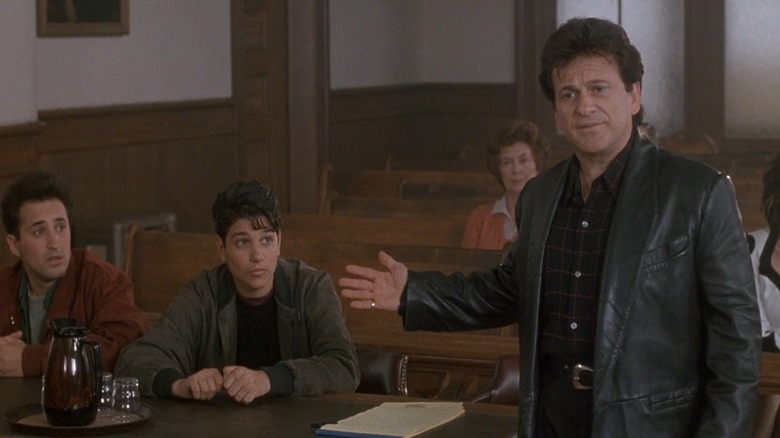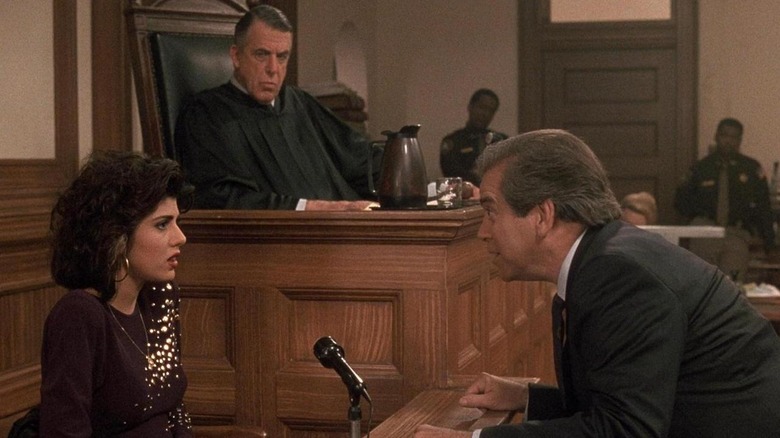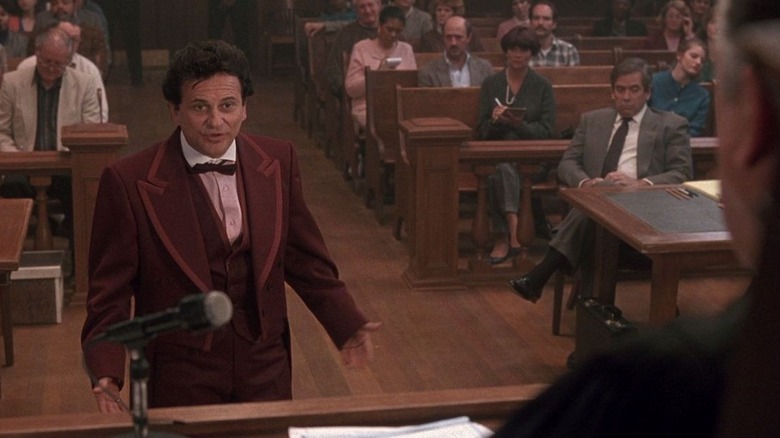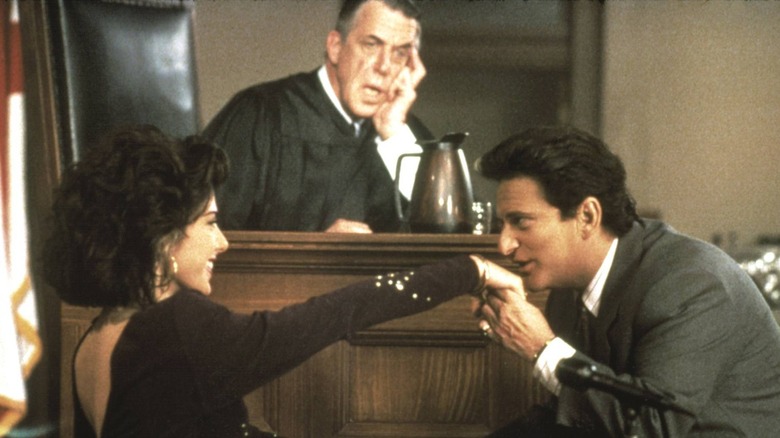30 Years After Its Release, My Cousin Vinny Is Still One Of The Best Legal Movies Of All Time
There are a lot of lessons to be learned from "My Cousin Vinny"; no self-respecting Southerner uses instant grits, positraction is a limited-slip differential, and even the most lucid, intelligent, well-thought-out objection can be overruled. These are the lessons of Vincent LaGuardia Gambini (Joe Pesci), the big city lawyer (well, sort of) who took on the deep south.
There's much to love about the tale of the Yankee that took on Alabama, but the real magic of "My Cousin Vinny" is in how it never makes a joke of the legal system — it just plays it for them. The gags in this oft-on-cable classic aren't derived from a kooky take on the criminal trial, but from placing a larger-than-life situation into one. By treating the legal system with just enough reverence to get a laugh out of a nervous public defender, 30 years after its initial release, "My Cousin Vinny" remains one of the greatest legal movies of all time.
A keen-eyed lawyer who might wince at the inaccuracies of cable legal dramas will feel comfort in this movie's accurate portrayal of the justice system, and that was part of its design. Director Jonathan Lynn ("Clue") chewed up the script from Dale Launer to pepper in as much accuracy as he was able. The former lawyer said of his take on the writing, "there were a lot of procedural changes." In the DVD commentary, Lynn reflected on the accuracy saying, "I get terribly irritated when I see films in which the legal procedure is obviously wrong." And his work paid off. In every little detail of the trial — from Vinny properly entering in evidence, to his needing to call an expert witness to avoid being a witness in his own trial, through to the objections made to his argumentative opening statement — the legal procedure is never forgone for the sake of rhythm, but it is used to add steps to the film's dance.
There are a lot of ways the story gets everything so right, tracking the criminal justice system at work, beat-by-beat. It starts with the incident, the arrest, the investigation, then onto the charges, the client meetings, pre-trial conferences, the arraignment, the pre-trial, the disclosure, the jury selection, the opening statements, the witness examinations and cross-examinations, and the expert testimony and rebuttal ... no wonder this early '90s flick is uncharacteristically long at almost two hours.
Vinny accurately defended the two yutes
A search of "best lawyer movies" will always lead you to "My Cousin Vinny," and even a shallow dive into its history will lead you to legal professionals singing its praises; its Wikipedia page rounds up glowing remarks from a Supreme Court Justice, a Seventh Circuit Court of Appeal Judge, and a law school professor. There's good reason for that, too. Aside from its accuracy, it does a brilliant job of treating the court proceedings as a neutral backdrop. Sure, the judge is crotchety, the cops are knuckleheads, and the prosecutor has the air of a baddie, but the villain in "My Cousin Vinny" isn't some corrupt system played for drama, it's merely the tale of the legal system at work.
Sure, Vinny isn't a master of courtroom procedure, but he understands the foundations of the criminal system. When speaking to his nephew, Vinny waxes poetic. "The D.A. is building a case," he tells him before using playing cards to construct a creative metaphor. Vinny knows his job isn't to "prove them innocent," but to make the jury look at the case from a different angle and see that it's as thin as playing cards.
And that's exactly what he does. With gusto.
The film spends a bulk of its runtime on the examinations and eventual cross-examinations of witnesses. Of all its beautifully accurate beats, this is where it really shines, showcasing the unique talents of a man who questions everything in order to get to the truth.
In an examination, the lawyer who called the witness has the opportunity to ask them open-ended questions so they can explain the evidence they are giving. In a cross-examination, the opposing counsel is able to ask leading, or "yes and no" questions, as a matter of rebutting their testimony. The jury then decides what they deem to be true (this is well explained in "The Social Network" when Marilyn Delpy says "Doesn't matter. I asked the question and now everyone's thinking about it."). Rebutting each witness, Vinny uses a lot of "is it possible" and "would you agree" questions, something rarely portrayed accurately on film. (Trust me, lots of us dream about properly cross-examining Andy Dufresne, and the greatest cross-x since Vinny comes from "Legally Blonde," where Elle perfectly puts a plausible alternative theory to her witness with great success.) In doing so, he successfully shreds the prosecutions' theory using his quick wit.
Vinny Gambini is all of us
Vincent LaGuardia Gambini represents a broader set of lawyers than we might immediately pay mind to. Media tends to portray the practice of law as a noble profession ("A Time to Kill"), as a profession for scum ("Liar Liar"), or as glamorous ("Suits"). On the sidelines in many of these stories are the personal injury lawyers or the lawyers who push for quick settlements, portrayed as the losers who couldn't quite hack it in the prestigious career.
Then there's Vinny (the proto-Elle Woods, he is even comfortable using legal jargon in everyday life. "Counteroffer!"), the underdog whose quick wit and creativity raise him to the status of a successful trial lawyer. Litigation is a specific subsect of the profession, one requiring a different skill set than other areas that tend to lead to the coveted real-world glamor, and Vinny is a showcase of the success available to kids who were told, "you're good at arguing, you should go to law school." But Vinny doesn't just argue for the sake of being adversarial, he questions what people insist is reality until he gets the truth, and that's why he, the guy who bests magicians claiming to make things disappear, makes a brilliant trial lawyer.
Whether lawyers want to admit it or not, many would glance at Vinny and think, "this dude is all of us." Staring at his somewhat phased client, Vinny admits he's been studying for the bar exam for six years. (Listen, the NY bar exam is brutal.) But what's more, Vinny breaks down the struggle of having to study while working in the garage and failing the test a few times, all of which casually nods to the privilege gap in legal grads and the realities of the barriers between aspiring lawyers and a corner office. Then there's his spat with the lovely Mona Lisa Vito (Marissa Tomei) where he laments that law school doesn't teach you procedure, "they teach you contracts, precedents, interpretations." Courtroom procedure is like the "taxes," of law school — you graduate with a fancy degree, then someone tells you to "file this motion" and you have no idea what they could possibly be requesting.
A criminal defense lawyer to the rescue?
Gambini also shines in portraying the criminal defense lawyer as the hero. Time has many of us reflecting on how media contributed to a view of the justice system that painted police as heroes and criminal defense lawyers as the snakes who sent murderers back on the streets.
Vinny Gambini, the defense lawyer, is the good guy (and the film's director even ensured it went so far as to have an anti-death penalty message). He's not alone, though. He comes from a long line of films about defense lawyers like "To Kill a Mockingbird," "Witness for the Prosecution," and "A Few Good Men" (which came out later the same year, can you believe?). The tiny setting of this movie uses Dutch angles when showing the police officers, lets the prosecutor be the cartoon villain (in style alone, the movie not having a true villain), and shows the fallibility of witnesses at the hands of decent defense. It doesn't force us to fester in ambiguity before showing the real incident in the finale, leaving us in the dark like in "The Shawshank Redemption." It starts with the real events and lets the audience flow through the movie, always on the side of the accused and their firecracker attorney.
Thirty years after the introduction of Mr. Gambini and Miss Vito, "My Cousin Vinny" remains endlessly watchable. The David v. Goliath story that pits Yankees against the American South doesn't chew up and spit out the legal system to create gags, it uses criminal procedure as the backdrop to push Vinny through his story of triumph. Watching this movie for the past thirty years is not just a lark because of how great Joe Pesci looks shooting a gun in boxers, Ewings, and a leather jacket, but because of how his cross-examinations ring true and show what an underdog is capable of with the right blend of specific intelligence.
"My Cousin Vinny" is a beautiful tale of the longshot that delivers the warmest, fuzziest version of a legal drama, all while wearing a vintage burgundy tux and tails.



